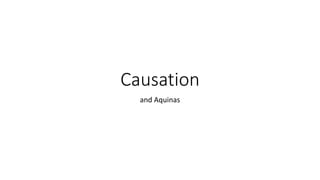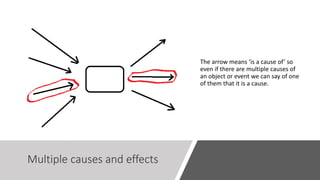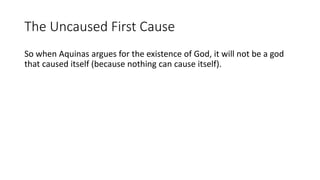Causation
- 2. Object Causation You could correctly say that the ball caused the broken window. Both the ball and the broken window are objects.
- 3. Event Causation You could also say that the throwing of the ball (an event) caused the breaking of the window (another event).
- 4. Itâs awkward but correct to say that Clara Barton caused the American Red Cross.
- 5. The failure of the South Fork Dam caused the Johnstown Flood.
- 6. Causation is Transitive Whether we talk about object or event causation, causation is transitive. That is, if A is a cause of B and B is a cause of C, then A must be a cause of C. In general, a relationship is transitive when the following argument is valid: A [is related to] B. B [is related to] C. So, A [is related to] C. For example, the relationship âis taller thanâ is transitive. If Anne is taller than Barb and Barb is taller than Carla then Ann must be taller than Carla. âIs the mother ofâ is not a transitive relationship.
- 7. Multiple causes and effects The arrow means âis a cause ofâ so even if there are multiple causes of an object or event we can say of one of them that it is a cause.
- 8. The no-loops argument Aquinas argues that in the whole complex causal history of the world, there are no loops. 1. Nothing can cause itself. 2. Causation is transitive. 3. So, there are no loops. To see it is valid, try RAA. Pretend there is a loop, then by transitivity A would be a cause of itself, but thatâs inconsistent with premise one!
- 9. The nothing can cause itself argument 1. Causes precede their effects. 2. Nothing can precede itself. 3. So, nothing can cause itself. The nothing can cause itself Argument
- 10. What this all means all together is that (according to Aquinas, at least) in the whole complex causal history of the world, no matter how closely you look, there wonât be any loops.
- 11. The Uncaused First Cause So when Aquinas argues for the existence of God, it will not be a god that caused itself (because nothing can cause itself).





![Causation is Transitive
Whether we talk about object or event causation,
causation is transitive. That is, if A is a cause of B and B
is a cause of C, then A must be a cause of C.
In general, a relationship is transitive when the
following argument is valid:
A [is related to] B.
B [is related to] C.
So, A [is related to] C.
For example, the relationship âis taller thanâ is transitive.
If Anne is taller than Barb and Barb is taller than Carla
then Ann must be taller than Carla. âIs the mother ofâ is
not a transitive relationship.](https://image.slidesharecdn.com/causation-180816023709/85/Causation-6-320.jpg)




